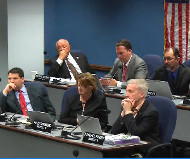1/22/2016
Arizona Representatives Backtrack On Support Of Photo Radar Expansion BillBackers of Arizona photo enforcement expansion legislation have a history of favoring the industry.

Tea Party Republicans were surprised earlier this week to learn that Arizona candidates who ran on a "pro liberty" campaign platform just sponsored legislation to expand the use of red light cameras, speed cameras and school bus cameras (view bill). After public outrage manifested itself in the form of emails, phone calls and posts on social media platforms, a handful of the eleven lawmakers behind the measure attempted to publicly distance themselves from the pro-camera effort.
Even so, the bill's supporters have a track record of working behind the scenes to expand photo radar. State Representative Bob Thorpe (R-Flagstaff), the primary sponsor, told an American Traffic Solutions (ATS) lobbyist last March that he intended to address the industry's concerns with a bill removing the requirement that tickets go to the driver committing a violation rather than just to a vehicle's registered owner.
"I'm very interested in running a bill next year to place the citation on the vehicle," Thorpe said in a March 19 committee hearing.
ATS has been promoting that legislative change for years, as it would significantly reduce the cost of processing citations. Thorpe added that he was "impressed" after meeting with ATS officials. The company's lobbyist returned the compliment.
"I have told members, if you care about your constituents, I think the political figure who takes that issue and runs with it will be rewarded by his constituents," ATS lobbyist Stan Barnes said. "I think you would be a hero for doing such a thing."
This week, however, the photo radar expansion bill's supporters became defensive. State Representative Kelly Townsend (R-Mesa) took to her Facebook page to distance herself from the pro-camera effort after being bombarded by complaints from constituents.
"Signed a bill just before the deadline," Townsend wrote. "It was not completely explained to me, and I misunderstood what it did. Glanced it over but should have waited. My own fault."
Except Townsend also has a record of backing red light cameras and speed cameras behind the scenes. In the Government and Higher Education Committee hearing last March, Townsend joined Thorpe in a 3 to 5 vote against a bill to ban automated ticketing machines. Had Thorpe and Townsend switched positions, the measure would have passed.
"Seeing the behavior change in the way people drive here in Arizona, it was clear that the cameras seem to be effective," Townsend said at the hearing. "I know my constituents don't want these. At this point I'm going to vote based off of what I'm seeing and what my conscience is telling me... I think that the benefits outweigh the things that we don't like about them. So for that reason I'm going to vote no."
This week, several members of the local Republican party complained about state Representative Mark Finchem's (R-Tucson) support for camera expansion just a few months after two-thirds of Tucson voters enacted a ballot initiative outlawing automated ticketing machines. Finchem responded defensively, saying he was just promoting "debate" on the issue.
"For the record, I have not received a dime from any safety camera manufacturer or service provider, and I call on those who make the claim to impugn my record, the ethics I stand for, provide proof," state Representative Mark Finchem wrote.
Respondents pointed out that Finchem took public funding for his campaign, and the state Clean Elections Fund is bankrolled in part by a $16.50 contribution from each photo radar citation issued in the state. That amount would increase to up to $75 per ticket under the Gang of Eleven photo radar bill. In addition, both Finchem and Townsend pledged to oppose photo radar in the 2014 Campaign for Liberty candidate survey.
"Mark, if you say one thing then do another, do not be surprised if you're called on in public," one constituent, Scot McDougal, fired back at the representative. "You serve the public."


